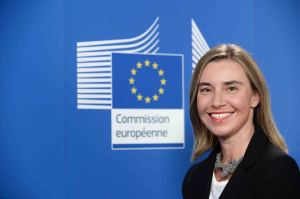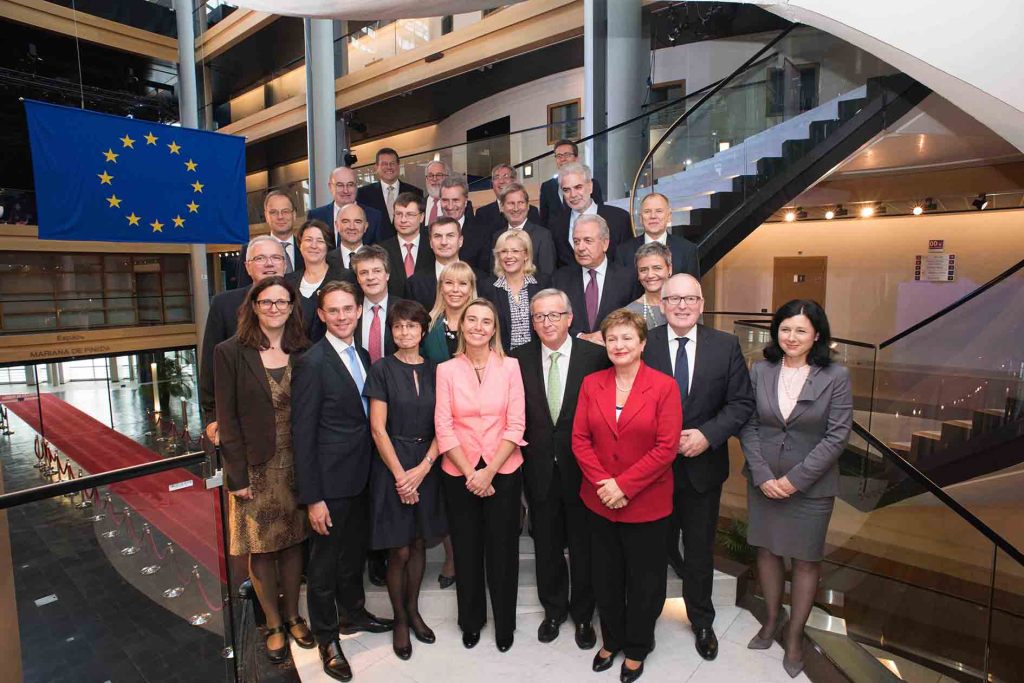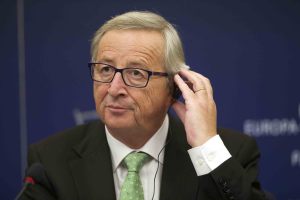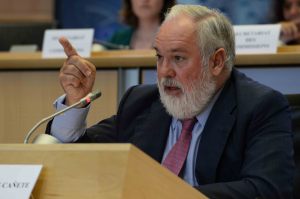In the first of this ‘Who’s who?’ series, Jules Meunier, Business Manager in the Shanghai Chapter, introduces Jean-Claude Juncker, Federica Mogherini and Miguel Arias Cañete.
Jean-Claude Juncker
Position: President of the European Commission
Age: 61
Nationality: Luxembourg
Party: European People’s Party (centre-right)
President Juncker is an extremely experienced politician on the European scene. From 1995 to 2013, he served as Prime Minister of Luxembourg, and was also President of the Euro Group—the informal meeting of Ministers of Finance from the Eurozone—from 2005 to 2013.
Following his confirmation by the European Parliament on 15th July, he became the first elected President of the EC and will lead the European Union (EU) executive body for the period 2014–2019.
He set up a team of Commissioners that should “put Europe back on the path to jobs and growth”[1] and, to achieve this, he defined a new working structure for the EC based on key roles given to each of the seven vice presidents.
In theory, 28 European Commissioners share the power to initiate legislation. In the new EC, each vice president will lead a project team that is supposed to mirror political guidelines, such as Energy Union; Jobs, Growth, Investment and Competitiveness; and Digital Single Market. All vice presidents will have the power “to stop any initiative, including legislative initiatives”[2] of commissioners working under their watch. This new organisation is expected to be a major evolution compared to the previous EC, and should drastically impact the foreign and trade policies of the EU.
The new Commission’s agenda will focus on ten priorities:
- A new boost for jobs, growth and investment;
- A connected digital single market;
- A resilient energy union with a forward-looking climate change policy;
- A deeper and fairer internal market with a strengthened industrial base;
- A deeper and fairer economic and monetary union;
- A reasonable and balanced free trade agreement with the US;
- An area of justice and fundamental rights based on mutual trust;
- Towards a new policy on migration;
- A stronger global actor; and
- A union of democratic change.
President Juncker is considered to have a good understanding of China from his dealings with three Chinese Premiers preceding Li Keqiang and his ten visits to the country. His first tour to China was in 1996 as the Luxembourg Prime Minister. He is expected to advance peaceful cooperation between China and the EU and advance negotiations on a bilateral investment and free trade agreement. He has asked his right-arm, Frans Timmermans, in his role as First Vice President in charge of the Rule of Law and the Charter of Fundamental Rights, to advise him on the matter and publicly said that, “There will be no investor-to-state dispute clause in TTIP if Frans does not agree with it too.”[3]
The Chinese Government expects Europe to adjust its foreign policy to a multi-polar world by being less dependent on the United States, and be more open to collaboration and negotiation with China. Furthermore, President Juncker’s ambition to create a digital single market for consumers and businesses has been greeted enthusiastically by Chinese multinational corporations seeking to advance their standing in the EU market.

Vice President Federica Mogherini, High Representative of the Union for Foreign Policy and Security Policy, photo (c) European Union, 2014
Federica Mogherini
Position: High Representative of the Union for Foreign Policy and Security Policy/Vice President of the European Commission
Age: 41
Nationality: Italian
Party: S&D – Socialists & Democrats (centre-left)
Prior to her appointment by the European Council at the end of August, High Representative Federica Mogherini was a Member of the Italian Parliament, following her election in 2008. She became Italy’s Foreign Minister in February 2014.
She is a political scientist, proficient in English and French, and her cabinet will be based in Berlaymont, the EC’s headquarters in Brussels. She is expected to play a major role in the new Commission alongside President Juncker and first Vice President Timmermans. Indeed, moments after his confirmation, President Juncker emphasised the need for the next High Representative to be a “strong and experienced player to combine national and European tools, and all the tools available in the Commission, in a more effective way than in the past.”[4]
As vice president of the EC, Mogherini will be responsible for steering and coordinating the work of all commissioners with regard to external relations. In order to cover the wide range of issues with an international dimension, she will be able to deputise other commissioners when appropriate. In particular, she will work closely with Cecilia Malmström, Commissioner for Trade.
Acting in concert with the Trade Commissioner could mark an important step towards a better-coordinated European approach to foreign policy, in which the EU is able to speak with one voice towards the Chinese Government. Mogherini will thus face a formidable challenge to achieve the objective of representing a unified European front towards China.
Before taking up her new position, she attended the Asia-Europe Meeting (ASEM) summit in Milan on 16th and 17th October, in the presence of Premier Li Keqiang. On this occasion the leadership of both sides renewed their commitment to maintain the high level of engagement and cooperation, aiming at an ambitious bilateral investment agreement and successful outcome of the 21st Conference of the Parties to the UN Framework Convention on Climate Change (COP21) in Paris in 2015.
Miguel Arias Cañete
Role: Commissioner for Climate Action & Energy
Age: 64
Nationality: Spanish
Party: EPP – European People’s Party (centre-right)
Miguel Arias Cañete is a trained lawyer but has carved a career as a politician focused heavily on agriculture. After serving in the Andalusian parliament, he became Member of the European Parliament (MEP) upon Spain’s accession to the EU in 1986. He remained an MEP until 1999, heading the Committees on Agriculture, and Regional Development during his tenure. In 2000, he was appointed Minister of Agriculture and Fishing for the Spanish Government.
Before being nominated in July for commissioner by the Spanish Government, Cañete was once again an MEP. He brings experience in the private sector and in the energy business having served on the board of several different Spanish oil companies.
Addressing the European Parliament, President Juncker defined his guidelines for the Climate Action & Energy Commissioner to develop a “resilient energy union with a forward-looking climate change policy”[5] and to ensure that the EU plays a leading role in international climate negotiations.
Energy and Climate Action used to be separate portfolios at the Commission, having been merged into one by President Juncker. As a consequence, Directorate General for Climate Action (DG CLIMA) and Directorate General for Energy (DG ENER) will report to Commissioner Cañete, giving him important resources at his disposal. However, under the new Commission organisational structure, Commissioner Cañete will work under the supervision of Vice President for Energy Union Maroš Šefčovič and Vice President for Jobs, Growth, Investment and Competitiveness Jyrki Katainen.
Cañete is expected to focus his efforts on the completion of the European internal market for energy, increase Europe’s energy security by diversifying sources and routes of energy imports and to strengthen and promote the European emissions trading system (ETS). The European ETS is currently the largest carbon market in the world, although China is expected to soon overtake it with a national scheme. All of these objectives will make him an important interlocutor in international forums negotiating directly with the Chinese authorities. Considering the current crisis in Ukraine and the lack of progress on climate change in the multilateral negotiations, Commissioner Cañete will have to be strongly involved in the international scene, especially to convince countries, such as China, to commit to binding objectives of CO2 emissions reduction.
From the very beginning of his mandate, his two initial priorities include steering the preparation of the legislative instruments following political agreement of the 2030 energy and climate framework as well as supporting Vice President Šefčovič to achieve a successful outcome of the 2015 international climate conference in Paris.
[1] http://ec.europa.eu/about/juncker-commission/docs/pg_en.pdf
[2] http://www.euractiv.com/sections/eu-priorities-2020/dutch-eu-nominee-wield-veto-right-over-excessive-bureaucracy-308344
[3] http://europa.eu/rapid/press-release_SPEECH-14-705_en.htm
[4] http://ec.europa.eu/about/juncker-commission/priorities/09/index_en.htm
[5] http://ec.europa.eu/about/juncker-commission/docs/arias-canete_en.pdf





Recent Comments